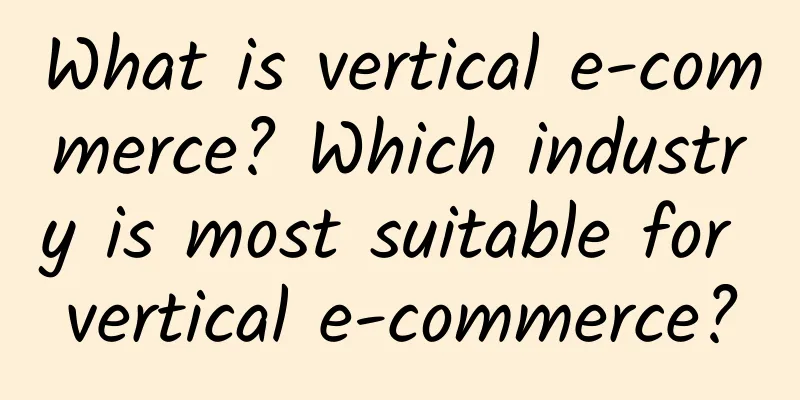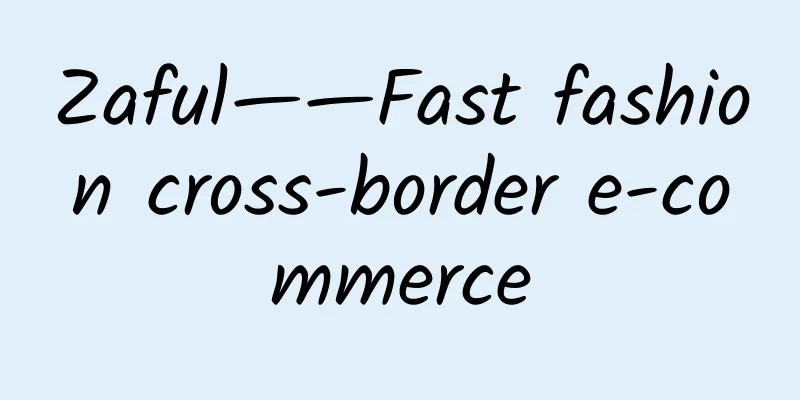What is vertical e-commerce? Which industry is most suitable for vertical e-commerce?

|
Vertical e-commerce is one of the operating modes of e-commerce. In fact, it has been developed relatively maturely in foreign countries such as the United States in the early days, and is still widely used in cross-border e-commerce circles, and most of them are B2B or B2C businesses for the same or related brands. So how to judge whether an e-commerce is vertical? An important point is whether the target customer group is consistent, such as men, the elderly, etc. Advantages of vertical e-commerce: The so-called verticality actually means focusing on one category and doing it well. Its clear direction greatly reduces the cost of acquiring customers. Vertical e-commerce integrates product management, services and channels, providing convenient and diversified choices for suppliers, retailers, buyers and even consumers, which greatly improves customer conversion rates and repurchase rates. Some people may be curious, with so many advantages, which industry is suitable for vertical e-commerce? The most important thing for vertical e-commerce is to maximize the platform value of users and to have high user stickiness. Some people think that clothes, shoes and hats are suitable, some think that digital products are suitable, and some think that industrial raw materials are more suitable... Then I think there is no clear answer to this. Whether it is suitable or not depends on how you do it: 1. Vertical categories. If this vertical e-commerce method is chosen, first of all, the variety of goods can be enriched to meet the customer's entire life cycle, including considering various pricing and promotional methods, etc., so as to guide customers to consume and achieve high frequency of repurchase. 2. Brand verticalization. This is crucial to the brand's popularity and influence, and needs to be based on a certain loyal customer base. Secondly, it is necessary to understand whether the brand's users have the habit of ordering online and whether the payment environment is convenient (whether large payments are required, shipping costs, etc.). Regarding vertical e-commerce, I still think it has a very promising future. How to expand and do well depends on the means of operation and promotion, the quality of products, and understanding of customer needs. To this end, we must understand what customers like and dislike. Making customers feel a sense of belonging and returning is not only the goal of vertical e-commerce, but also the goal of every cross-border e-commerce seller! This article introduces the basic understanding of vertical e-commerce. Please pay more attention to it in the future. |
>>: What is the process of opening a store on eBay? What do I need to prepare to sell on eBay?
Recommend
Overgrowth--covering the entire traffic of Amazon platform
What is Overgrowth? Overgrowth is a brand and soc...
How is Ant Logistics? What services does Ant Logistics provide?
How about Ant Logistics? Chengdu Ant Logistics Co...
ISCC (International Sustainability and Carbon Certification)-"Hot Products Coming"
ISCC ISCC certification is committed to supportin...
Mattel Factory Inspection Consultation Process
Zero Tolerance •Child Labor (<16 year old) •Fo...
Woolworths Quality Inspection Document List
Woolworths Quality Inspection Document List 1. Bu...
All BSCI members who need factory inspection (four)
REWE Group Factory Inspection Consulting/Certific...
REACH - "Registration, Evaluation, Authorization and Restriction of Chemicals"
What is REACH? REACH (REGULATION concerning the R...
How is Kahan International Logistics? What are the advantages of Kahan International Logistics?
How about Kahan International Logistics? Guangzho...
Factory inspection tips: SEDEX/SMETA/ETI
The SEDEX factory audit we often talk about is ac...
The new version of the National Basic Safety Technical Specifications for Textile Products will be officially implemented on August 1
It is reported that the highly anticipated nation...
Ann Taylor Supplier Code of Conduct
AnnTaylor Supplier Code of Conduct When customers...
What are the hot search terms on eBay's US site? Let's take a look at what they are searching for.
This article takes a look at the hot search terms...
What is India's BIS certification? Come and have a look
What is Indian BIS certification? What is the use...
What is LightInTheBox? How to open a LightInTheBox store?
In March 2007, LightInTheBox was officially launc...
Share eBay Best Match ranking rules
1) What is Best Match? First, Best Match source: ...









